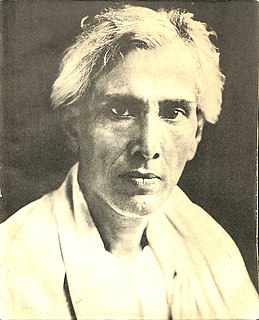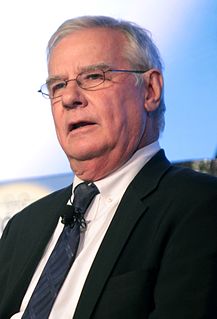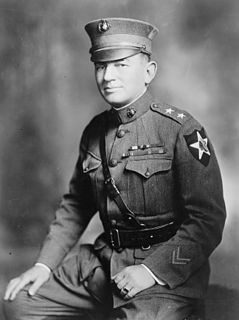Top 653 Regulations Quotes & Sayings - Page 11
Explore popular Regulations quotes.
Last updated on November 26, 2024.
...I believe it is woman's right to have a voice in all the laws and regulations by which she is to be governed; whether in Churchor State; and that the present arrangements of society, on these points, are a violation of human rights, a rank usurpation of power, a violent seizure and confiscation of what is sacredly and inalienably hers--and thus inflicting upon woman outrageous wrongs, working mischief incalculable in the social circle, and in its influence on the world producing only evil, and that continually.
The road, more than simply a system of regulations and designs, is a place where many millions of us, with only loose parameters for how to behave, are thrown together daily in a kind of massive petri dish in which all kinds of uncharted, little-understood dynamics are at work. There is no other place where so many people from different walks of life-different ages, races, classes, religions, genders, political preferences, lifestyle choices, levels of psychological stability-mingle so freely.
We are under the stifling regulation and taxes of a predominantly left-wing type of thinking and philosophy. The eight years of Barack Obama have shrouded this country in punitive regulations. We haven't had economic growth higher than one and a half percent for the last eight or nine years, and that was done on purpose. There have been robust times in the past, and there are a lot of people right now that are doing well and are growing. But generally it ought to be much better in the past. There needs to be an economic revival.
I think an erotics of place may be one of the reasons why environmentalists are seen as subversive. There is a backlash now:... [ellipsis in source] take all the regulations away; weaken existing legislation; the endangered species act is too severe, too restrictive; let there be carte blanche for real-estate developers. Because if we really have to confront wildness, solitude, and serenity, both the fierceness and compassionate nature of the land, then we ultimately have to confront it in ourselves, and it's easier to be numb, to be distracted, to be disengaged.
However much pains may be taken to combine the soldier and the citizen in one and the same individual, whatever may be done to nationalize wars, never will it be possible to do away with the professionalism of the business; and if that cannot be done, then those who belong to it will always look upon themselves as a kind of guild, in the regulations, laws, and customs in which the "Spirit of War" finds its expression. It would be very wrong to look down upon this corporate spirit, or esprit de corps, which may and should exist more or less in every Army.
Trusting people to be creative and constructive when given more freedom does not imply an overly optimistic belief in the perfectibility of human nature. It is, rather, belief that the inevitable errors and sins of the human condition are far better overcome by individuals working together in an environment of trust and freedom and mutual respect than by individuals working under a multitude of rules, regulations, and restraints imposed upon them by another group of imperfect individuals.
The banks, because of mismanagement, because of huge risk taking, are now in very vulnerable positions. We can expect that we're gonna have to do more to shore up the financial system. We also are gonna have to make sure that we set up financial regulations so that not only does this never happen again, but you start having some sort of - trust in how the credit markets work again.
Carefully observe the natural laws in operation in the world around you, and live by them. From following them, you will learn the morality of modesty, moderation, compassion, and consideration (not just one society's rules and regulations), the wisdom of seeing things as they are (not of merely collecting "facts" about them), and the happiness of being in harmony with the Way (which has nothing to do with self-righteous "spiritual" obsessions and fanaticism). And you will live lightly, spontaneously, and effortlessly.
A lot of these things have hurt the average American. When they look at the banks and they say, "Well, the bank's talking its own game," I am telling you, what we've done in mortgage lending, our inability to have proper regulations around mortgages, has hurt average Americans. First-time buyers, immigrant buyers, prior defaults, self-employed, because they can't get a mortgage. Will it make a big difference to JPMorgan Chase? No, but you're hurting my fellow citizens. Let's go at it, and let's fix it.
Mr. Speaker, in 1848, Karl Marx said, a progressive income tax is needed to transfer wealth and power to the state. Thus, Marx's Communist Manifesto had as its major economic tenet a progressive income tax. Think about it, 1848 Karl Marx, Communism.... I say it is time to replace the progressive income tax with a national retail sales tax, and it is time to abolish the IRS, my colleagues. I yield back all the rules, regulations, fear, and intimidation of our current system.
And so in 1975, the grizzly bear was put on, as I said - on the endangered species list as threatened. And new measures were taken, for instance, bear-proofing garbage, creating new regulations to - essentially to try and keep people and people's food away from the bears, let the bears adjust to eating the abundant wild food that's available in Yellowstone and allow them to be more wild, to be independent of humans as sources of foods for the good of both sides. And that has been quite successful.
Throughout human history, as our species has faced the frightening, terrorizing fact that we do not know who we are, or where we are going in this ocean of chaos, it has been the authorities - the political, the religious, the educational authorities - who attempted to comfort us by giving us order, rules, regulations, informing - forming in our minds - their view of reality. To think for yourself you must question authority and learn how to put yourself in a state of vulnerable open-mindedness, chaotic, confused vulnerability to inform yourself.
The term anarchism has become associated with two phenomena with which real anarchist don't want to associate themselves with. One is violence, and the other is disorder or chaos. The popular conception of anarchism is on the one hand bomb-throwing and terrorism, and on the other hand no rules, no regulations, no discipline, everybody does what they want, confusion, etc. That is why there is a reluctance to use the term anarchism.
When we ask Negroes to abide by the law, let us also declare that the white man does not abide by law in the ghettos. Day in and day out he violates welfare laws to deprive the poor of their meager allotments; he flagrantly violates building codes and regulations; his police make a mockery of law; he violates laws on equal employment and education and the provisions of civil services. The slums are the handiwork of a vicious system of the white society; Negroes live in them, but they do not make them, any more than a prisoner makes a prison.
Life can be lived in rules, but then life becomes superficial. Live life not according to the laws but according to consciousness, awareness. Don't live life according to the mind. Mind has rules and regulations, mind has rituals. Live life from the standpoint of no-mind so that you can bloom into unpredictable flowers.
A Christian should know that God is a Creator, that God is an entity that is all-powerful and all knowledgeable, God is everywhere and God is an entity filled with grace, love, compassion and forgiveness, that Jesus is the son of God and Jesus came on earth to explain to people in a very revolutionary way the nature of God, that God was not a stern judge who was keeping track of 600 or so rules and regulations that you had to keep in order to be acceptable to God.
The President [Barack Obama] became quite emotional about transgender student rights, threatening to pull Department of Education funds from school districts that do not comply with federal regulations. Black children are suspended from school three times more than white children are, and there is no evidence that black children are three times as unruly.
Adding more people causes problems. But people are also the means to solve these problems. The main fuel to speed the world’s progress is our stock of knowledge; the brakes are our lack of imagination and unsound social regulations of these activities. The ultimate resource is people—especially skilled, spirited, and hopeful young people endowed with liberty—who will exert their wills and imaginations for their own benefits, and so inevitably they will benefit the rest of us as well.
For indeed, grace is the key to it all. It is not our lavish good deeds that procure salvation, but God's lavish love and mercy. That is why the poor are as acceptable before God as the rich. It is the generosity of God, the freeness of his salvation, that lays the foundation for the society of justice for all. Even in the seemingly boring rules and regulations of tabernacle rituals, we see that God cares about the poor, that his laws make provision for the disadvantaged. God's concern for justice permeated every part of Israel's life. It should also permeate our lives.
Welfare mostly subsidizes people in poverty, helping few escape from it. In their hearts, most people who are poor would like to be rich, or at least self-sustaining, but this president never talks about how they might achieve that goal. Instead, he criticizes those who made the right choices and now enjoy the fruits of their labor. Rather than use successful people as examples for the poor to follow, the president seeks to punish the rich with higher taxes and more regulations on their businesses.
You know, people like Hillary Clinton think you grow the economy by growing Washington. I think most of us in America understand that people, not the government creates jobs. And one of the best things we can do is get the government out of the way, put in reign in all the out of control regulations, put in place and all of the above energy policy, give people the education, the skills that the need to succeed, and lower the tax rate and reform the tax code.
Why must I cling to the customs and practices of a particular country forever, just because I happened to be born there? What does it matter if its distinctiveness is lost? Need we be so attached to it? What's the harm if everyone on earth shares the same thoughts and feelings, if they stand under a single banner of laws and regulations? What if we can't be recognized as Indians any more? Where's the harm in that? No one can object if we declare ourselves to be citizens of the world. Is that any less glorious?
Energy is a sector of the economy that has been particularly resistant to innovation. This is precisely the problem. It is why we are still dependant on energy sources that are 100 to 150 years old while virtually every other sector of the economy has transformed itself. This is why we believe that the faith that many environmentalists still hold that carbon regulations and taxes will drive sufficient private sector investment into energy markets to create the kind of innovation we need is unfounded.
The global financial crisis is a great opportunity to showcase and propagate both causal and moral institutional analysis. The crisis shows major flaws in the way the US financial system is regulated and, more importantly, in our political system, which is essentially a bazaar of legalized bribery where financial institutions can buy themselves the governmental regulations they want, along with the regulators who routinely receive lucrative jobs in the industry whose oversight had formerly been their responsibility, the so-called revolving-door practice.
Love never comes with a brochure of rules and regulations, a prospectus with guides of what is acceptable and what is abominable. It’s a standard to follow your heart, and that’s what I did and if doing that hurt you, then I’m sorry… sorry for coming in your life and wasting your time, for causing you an anguish so great that you could not bear the sight of me. Today, I am proud to stand up and honour myself and proclaim to the world… yes, I loved someone more than myself. I loved someone truly, madly, deeply!
You have to have a government to provide you with legal order, with stability, enforcement of property rights, enforcement of contracts, definition of rules and regulations - the rules of the game, so to speak - and to provide certain shared goods and services, public services. Several people have tried to estimate this and they come out with figures like government spending at 15% of GDP. In the modern world it has gone to 40% or above. So we are way beyond the optimal, and that is easier to say than what the optimum is.
I left small businesses a little while ago and they were all complaining that Obamacare is putting them out of business. Not only the regulations, which are a disaster and the taxes, but Obamacare is putting them out of business. So you have that concept, the savings accounts, health care. What you really have are ways of getting people energized by take - you have to take down the lines between the state so you have competition.
The Environmental Protection Agency's (EPA) own computer model easily shows that President Obama's proposed regulations would reduce global warming by around 0.02 of a degree Celsius by the year 2100. Actually, the true number is probably even smaller because that calculation assumes a future rate of warming - there hasn't been any for 17 years now - quite a bit higher than it is likely to be.
At some point in every racer's life he has to make his peace with cheating. I do not approve of cheating ... at all. Of course, like every successful racer, I differentiate between taking advantage of loopholes in the regulations, stretching the grey areas and outright cheating. In any given racing series I will not start the cheating. If someone else starts it, I will appeal to them and to the officials to stop it. If my efforts do not succeed, then I'll show them how it is done.
[D]ecade after decade, through taxes and regulations, governments at all levels took ever-increasing control over people's lives, wealth, and property. The control grew exponentially, decade after decade. The rationale was that the control was necessary -- for society, for the poor, for the nation, even for freedom itself. Americans continued living their life of the lie: they continued believing that the more control government exercised over their lives and property, the freer they became.
Electric service providers in Missouri have warned that the EPA's so-called Clean Power Plan will raise energy costs for Missourians, reduce jobs, and hurt our state's economic competitiveness. As a member of the Senate Appropriations Committee, I've fought hard to ensure provisions that would defund this harmful power grab were included in the final appropriations bill. I also support legislation to block this harmful rule and protect workers and families from the damaging effects of the Obama Administration's executive overreach and costly energy regulations.
First, the constitution ought to secure a genuine and guard against a select militia, by providing that the militia shall always be kept well organized, armed, and disciplined, and include, according to the past and general usuage of the states, all men capable of bearing arms; and that all regulations tending to render this general militia useless and defenceless, by establishing select corps of militia, or distinct bodies of military men, not having permanent interests and attachments in the community to be avoided.
How did I get into the world? Why was I not asked about it and why was I not informed of the rules and regulations but just thrust into the ranks as if I had been bought by a peddling shanghaier of human beings? How did I get involved in this big enterprise called actuality? Why should I be involved? Isn't it a matter of choice? And if I am compelled to be involved, where is the manager—I have something to say about this. Is there no manager? To whom shall I make my complaint?
Stephen Colbert's recent comment is apropos: When the Republican legislature of North Carolina responded to a scientific study predicting a threatening rise in sea level by barring state and local agencies from developing regulations or planning documents to address the problem, Colbert responded: "This is a brilliant solution. If your science gives you a result that you don't like, pass a law saying the result is illegal. Problem solved."
But science can only be created by those who are thoroughly imbued with the aspiration toward truth and understanding. This source of feeling, however, springs from the sphere of religion. To this there also belongs the faith in the possibility that the regulations valid for the world of existence are rational, that is, comprehensible to reason. I cannot conceive of a genuine scientist without that profound faith. The situation may be expressed by an image: science without religion is lame, religion without science is blind.
The private citizen today has come to feel rather like a deaf spectator in the back row, who ought to keep his mind on the mystery off there, but cannot quite manage to keep awake. He knows he is somehow affected by what is going on. Rules and regulations continually, taxes annually and wars occasionally remind him that he is being swept along by great drifts of circumstance. Yet these public affairs are in no convincing way his affairs. They are for the most part invisible. They are managed, if they are managed at all, at distant centers, from behind the scenes, by unnamed powers.
Be kindly and just in your dealings with your men. Never play favorites. Make them feel that justice tempered with mercy may always be counted on. This does not mean a slackening of discipline. Obedience to orders and regulations must always be insisted upon, and good conduct on the part of the men exacted. Especially should this be done with reference to civilian inhabitants of foreign countries in which Marines are serving.
The cult of the omnipotent state has millions of followers in the united States. Americans of today view their government in the same way as Christians view their God; they worship and adore the state and they render their lives and fortunes to it. Statists believe that their lives - their very being - are a privilege that the state has given to them. They believe that everything they do is - and should be - dependent on the consent of the government. Thus, statists support such devices as income taxation, licensing laws, regulations, passports, trade restrictions, and the like.
This is the free enterprise system. The only place in the world that I can recall where companies never failed was the old Soviet Union. This is what investors do in free enterprise and capitalism system. [...[ And, yes, free enterprise system can be cruel. But the problem with this administration is that small businesses are the one who had suffered the most, the kind that need investors, the kinds that don't need the hundreds of pages, thousands of pages of regulations that continue to plague them and have them hold back on the hiring investment.
There is a regulation of behavior on the Internet and in cyberspace, but that regulation is imposed primarily through code. The differences in the regulations effected through code distinguish different parts of the Internet and cyberspace. In some places, life is fairly free; in other places, it is more controlled. And the difference between these spaces is simply a difference in the architectures of control--that is, a difference in code.
Congress can protect small businesses by providing effective oversight over SBA policies and make sure they take into account the needs of small businesses while also protecting taxpayer dollars. Congress also needs to make sure that new banking regulations do not make it more costly for community banks to lend to small businesses.
That's the problem with the financial sector. Banks and the financial sector live in the short run, not the long run. In principle the government is supposed to make regulations that help the economy over time. But once it's taken over by the financial sector, the government lives in the short run too.
However, you have to recognize that regulations will never be completely successful and they will always be full of holes. You must constantly be ready to fill new holes. Actually regulation should be kept to a minimum, but there has to be some cooperation between market participants and authorities - as was the case in the early postwar years. The Bank of England was a very successful regulator by cooperating with market participants. This cooperative spirit was broken by the market fundamentalists.
When we get this health care done, America, we're going to be able to have regulations on how heavy you can be. And we're going to be able to set up various tax penalties, for example, if you weigh more than we think you should or we just may not let you get on that airplane because your carbon footprint, you're gonna waste so much jet fuel, we may not let you get on that bus, we may not let you drive your car, we may not build a bigger doorway for you to get through, may not give you a bigger toilet.'
Marla [from Rules Don't Apply] especially, believed that she has a certain set of rules that she had to abide by, in order to be successful in Hollywood. How she acted, how she approached things and even in her relationship with her mother - there were a lot more rules and regulations expected of ambitious women, even before they got into the door.
People think what's in the US today is capitalism. It's not even close to capitalism. Capitalism doesn't have a central bank, capitalism doesn't have taxes, it doesn't have regulations; capitalism is just voluntary transactions. What they have in the US today I call crapitalism. But it's sad that so many people are confused and they think, 'Oh that's free markets in the US', when it's one of the least free market countries on earth.
History has shown that there are very few mechanisms as effective at maintaining the status quo as a set of institutionalized regulations. Once set in regulatory concrete, reconsideration of the basic underlying assumptions is very difficult. While it will be an uphill fight to re-examine the basic underlying assumptions of any law or administrative rule, it is clearly not impossible. It will just take longer than if not so well institutionalized.
If we're talking about buying exchanges abroad, we have to have global securities standards, as we have global banking regulations. I'm talking about margins. Now, the United States has certain margin requirements that are not the same in London. Investors and hedge funds that want to borrow more money against securities ? if they can't in the U.S., they go abroad. That could add additional risks to the global economy.
Whereas nationalism still seeks power, honour, and glory through means that endanger other countries, patriotism knows that a country's strength and honour can only be permanently safeguarded through concourse with other countries. And whereas nationalism scoffs at the idea of international laws and regulations, patriotism seeks to create such.
The conservative goal has been the Third Worldization of the United States: an increasingly underemployed, lower-wage work-force; a small but growing moneyed class that pays almost no taxes; the privatization or elimination of human services; the elimination of public education for low-income people; the easing of restrictions against child labor; the exporting of industries and jobs to low-wage, free-trade countries; the breaking of labor unions; and the elimination of occupational safety and environmental controls and regulations.
I got married three days after graduation, and the first thing I did what I was expected to do which was to work on a small newspaper. So we were in Chicago where my husband worked for the Chicago Sun-Times and we were having dinner with his editor and he said 'So what are you 'gonna do honey?' and I said 'I'm going to work on a newspaper', and he said 'I don't think so", because Newspaper Guild regulations said that I couldn't work on the same newspaper as my husband.
I think knowing you're not alone is important. This generation is already better at standing up for themselves, saying, "No! You're not going to treat me like that. My standards are higher." But we can provide more education through stories. Just because someone who is older or with more authority says you have to do something, there's no reason you need to. One good thing is that there are new rules about how old you can be on set - more regulations. I think those are good.


















































